The Global Smart Grid Federation endorses the International Energy Agency's global smart grid roadmap and increased collaboration between governments and the private sector at Clean Energy Ministerial.
The company's study suggests that technologies, such as re-injection or pipeline development, exist to capture and use the gas instead of flaring it into the atmosphere.
Greenopia, an online directory for green, sustainable, and socially conscious purchase decisions, has updated its oil company sustainability guide.
The technology uses electricity-generating coatings that are "sprayed" on glass surfaces; the solar coatings are less than 1/10th the thickness of "thin" films and make use of the world’s smallest functional solar cells.
Two reports from Citi and Ceres predict U.S. car manufacturers will see greater sales than their global competitors.
The product, based on materials used to clean up Three Mile Island's nuclear disaster, reportedly removes radioactive isotopes from aqueous solutions.
EPA streamlines regulations for car and truck fuel conversion systems with new options that encourage innovation and maintain air quality protections.
Here's a snapshot of personnel moves, recognition, contracts awards, partnerships, and new company names that were announced in March.

In three to five years, environmental professionals could be using nanogenerators as a power source for sensors used in infrastructure monitoring, according to researchers.
The Northeast States for Coordinated Air Use Management has released a report that claims pollution control technologies are available and already at work in many plants.
The $2 million contract, funded at 80 percent with ARRA money, was awarded by The University of Texas Southwestern Medical Center in Dallas.
In response to an agreement with Riverkeeper, EPA is seeking comment on its proposed regulations to minimize fish impingement and entrainment in cooling water systems.

Birmingham study suggests that birds may not be looking at what obstacles are straight ahead and some of them may not be able to slow their flying speed.
EPA has updated its emissions and generation database, or eGrid, with 2007 data, allowing users to access the information using ZIP codes.
EPA and USDA are monitoring food, rain, and potable water for levels of radioactivity that may have drifted to the United States from Japan.
Researchers at the U.K.'s Cambridge University mixed samples of waste oil with a highly microwave-absorbent material and then heated the mixture to convert nearly 90 percent of the samples into fuel.
Richard Brodsky with Demos, a national policy center, and three other groups have filed Freedom of Information Act requests prompted by the nuclear disaster in Sendai, Japan.
MIT’s Daniel Nocera said he believes the future world will be powered by photosynthesis and his research has developed one that uses nickel and cobalt to split water into hydrogen and oxygen.
The Clean Energy Group, which is a coalition of electric power companies, has reviewed the proposal and says the rule allows for some compliance flexibility.
The dairy launches renewable energy effort with the start of megawatt wind power project in Lancaster County, Pa.